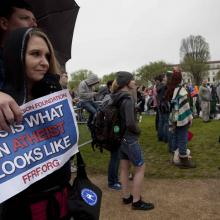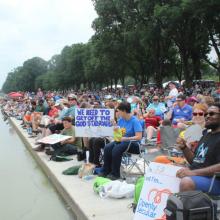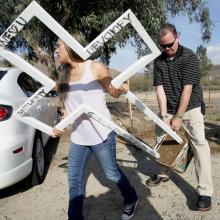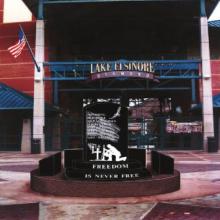American Humanist Association
When President Obama signed a newly strengthened international religious freedom act on Dec. 16, the intention was to protect religious believers around the world.
But the freshly signed act is being heralded by some legal scholars as a different milestone — for the first time, atheists and other nonreligious persons are explicitly named as a class protected by the law.

Image via Tyrone Turner / RNS
Not all Americans pray. So the American Humanist Association, among the largest national advocacy groups of nonbelievers and other secularists, wants the first Thursday in May to be recognized by Congress as a National Day of Reason. But that day is already designated as the National Day of Prayer, with a 65-year history of support from Congress, state and local governments and every sitting president since its inception in 1952.
Reading religion surveys can seem like confronting the Tower of Babel: stacked questions, confusing terms, unscientific methodology.
It gets even crazier when results are contradictory. How does that happen?
Some surveys lean like the Tower of Pisa
The Pledge of Allegiance is a perfect example.
There’s almost always a flap over how many Americans do — or don’t — want the words “under God” kicked out of the Pledge of Allegiance. Indeed, on Nov. 19 a court in Monmouth, N.J., will hear the case of the American Humanist Association battling the Matawan-Aberdeen Regional School District to have schools edit out mention of God.
The humanists claim 34 percent of Americans agree with their view. But, wait. What about a survey conducted earlier this year by LifeWay Research, a Christian research agency? It found that only 8 percent would cut God from the Pledge.
Why four times the difference? Look to the poll language.
LifeWay asked: “Should the words ‘under God’ be removed from or remain in the Pledge of Allegiance to the United States of America?” That’s a straight-up question with no preface.
The humanists’ survey, however, began with a bit of pointed Pledge history — before getting to the (loaded) question:
“For its first 62 years, the Pledge of Allegiance did not include the phrase ‘under God.’ During the Cold War, in 1954, the phrase ‘one nation, indivisible … ‘ was changed to read ‘one nation, under God, indivisible … ‘. Some people feel this phrase in our national pledge should focus on unity rather than religion.
A California resort town, already reeling from a legal fight over the placement of memorial crosses at a minor league baseball stadium, is now engaged in another round of bitter acrimony over the display of crosses on public land.
Not long after, another family appeared at the scene to erect six smaller wooden crosses at the same site. Each bore a handwritten message, including “What if this was your child?”, “To each his own,” and “Get a life.”
A California federal judge has rejected a proposed religious memorial at a publicly owned baseball stadium as a violation of both federal and state laws.
On Thursday, U.S. District Judge Stephen V. Wilson of California’s Central District ruled that a granite monument depicting a soldier kneeling in prayer before a cross lacked “a secular purpose” and has “the unconstitutional effect” of endorsing religion over nonreligion.
The decision came nine months after a lawsuit was filed by the American Humanist Association, a national organization of nonbelievers. The memorial was planned for city property in Lake Elsinore, Calif., a community of about 53,000 people in Southern California’s Riverside County.
An organization of nonbelievers is threatening legal action against public schools that participate in an evangelical Christian charity that delivers Christmas toys to poor children.
The American Humanist Association, a national advocacy organization with 20,000 members nationwide, sent letters this week to two public elementary schools after parents complained their children were being asked to collect toys and money for Operation Christmas Child.
Operation Christmas Child is a project of Samaritan’s Purse, an evangelical relief organization founded by Franklin Graham, son of evangelist Billy Graham. Its stated mission is “to follow the example of Christ by helping those in need and proclaiming the hope of the Gospel.”
The toys collected by Operation Christmas Child come with an invitation for recipients to accept Christianity. Since its founding in 1993, Operation Christmas Child has sent 100 million boxes of toys to poor children.
A former United Methodist minister-turned-atheist was dismissed from her high-profile position at Harvard University on Thursday after it was revealed she falsified her resume.
Teresa MacBain, one of the most high-profile nonbelievers in the country after profiles by NPR, The New York Times, and Religion News Service, was fired from her newly created position with the Humanist Community at Harvard.
Massachusetts’ highest court on Wednesday will consider whether the daily recitation of the Pledge of Allegiance is a violation of students’ rights.
Since the addition of the phrase “under God” in 1954, the pledge has been challenged repeatedly as a violation of the separation of church and state. In 2004, one case reached the Supreme Court, but ultimately failed, as have all previous challenges.
But the current case before the state’s Supreme Judicial Court, Doe v. Acton-Boxborough Regional School District, is different because lawyers for the plaintiffs, an anonymous atheist couple, won’t be arguing about federal law but rather that the compulsory recitation of the pledge violates the state’s equal rights laws. They argue that the daily recitation of the pledge is a violation of their guarantee of equal protection under those laws.
A woman who has lived legally in this country for more than 30 years was granted her request to become a naturalized United States citizen Thursday after initially being refused conscientious objector status because she is not religious.
Margaret Doughty, who came to the U.S. in 1980 from England, was informed by U.S. Citizenship and Immigration Services that unless she provided a letter from a church or a religious official by June 21 backing up her assertion that her “lifelong spiritual/religious beliefs” would prevent her from taking up arms for the U.S., her application would be denied.
Immigrants seeking citizenship must pledge to defend the U.S., unless they can prove they are conscientious objectors — people whose religious beliefs prevent them from engaging in war. Conscientious objector status has been awarded to Quakers, Buddhists, and others.
Amanda Holowaty didn’t need God to get married. She just needed her husband Mike.
When the Wilmington atheist couple decided to join their lives a year ago, they knew they wanted a secular wedding celebrant, but their families weren’t so sure. Her family is Methodist and his is “generally spiritual.” And they worried about even telling Mike’s grandmother, who is Eastern Orthodox. So they found a wedding celebrant ordained through the Humanist Society, Han Hills, who allowed their family members to read a spiritual poem.
“Nobody seemed to notice that we didn’t mention God,” Holowaty said. “People came up afterward and said it was one of the best weddings they’d seen.”








